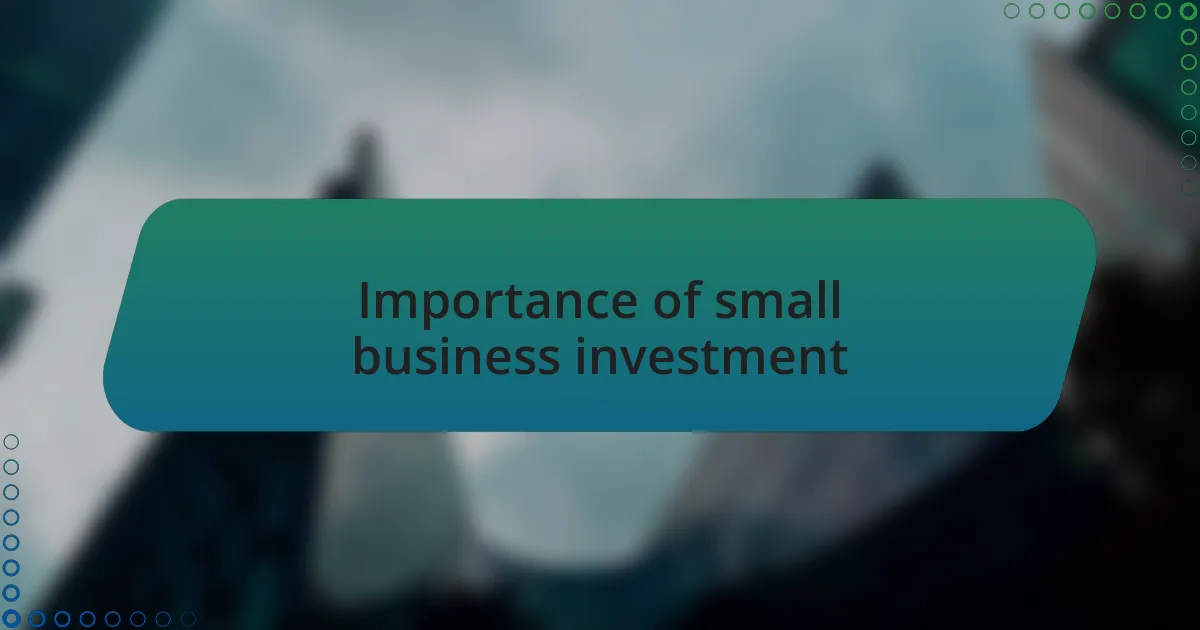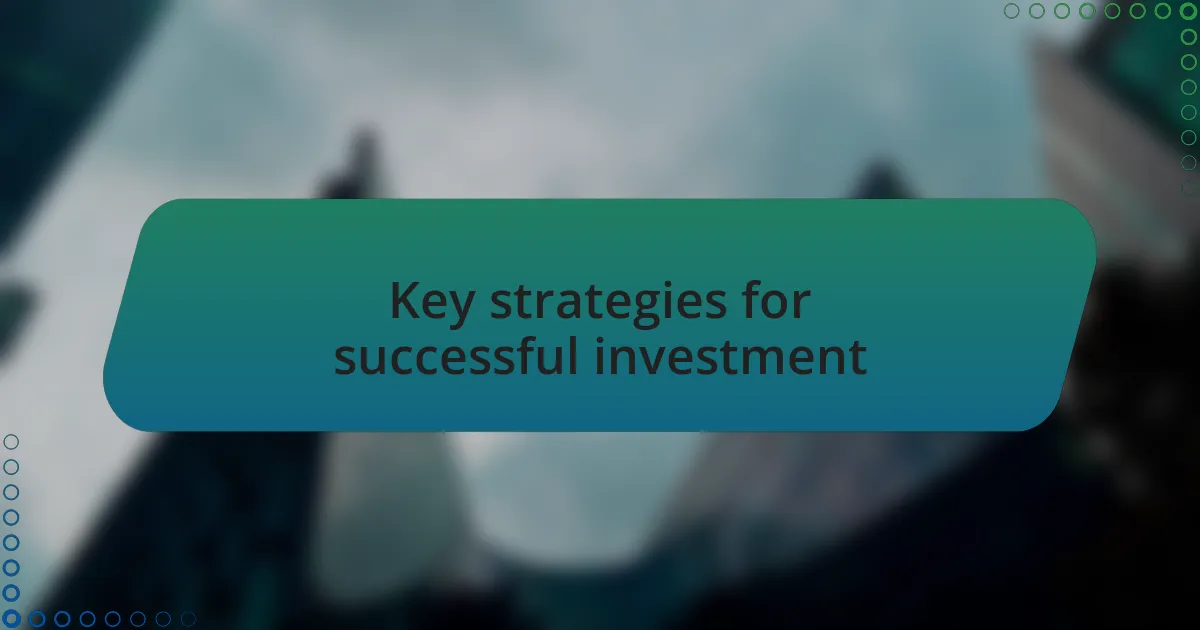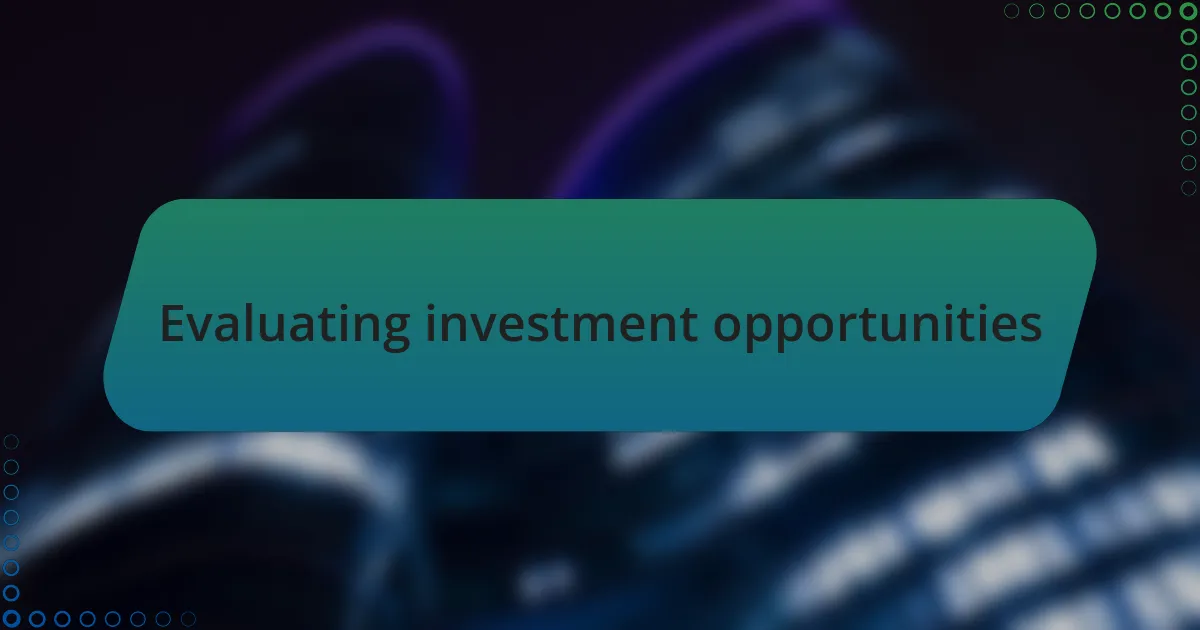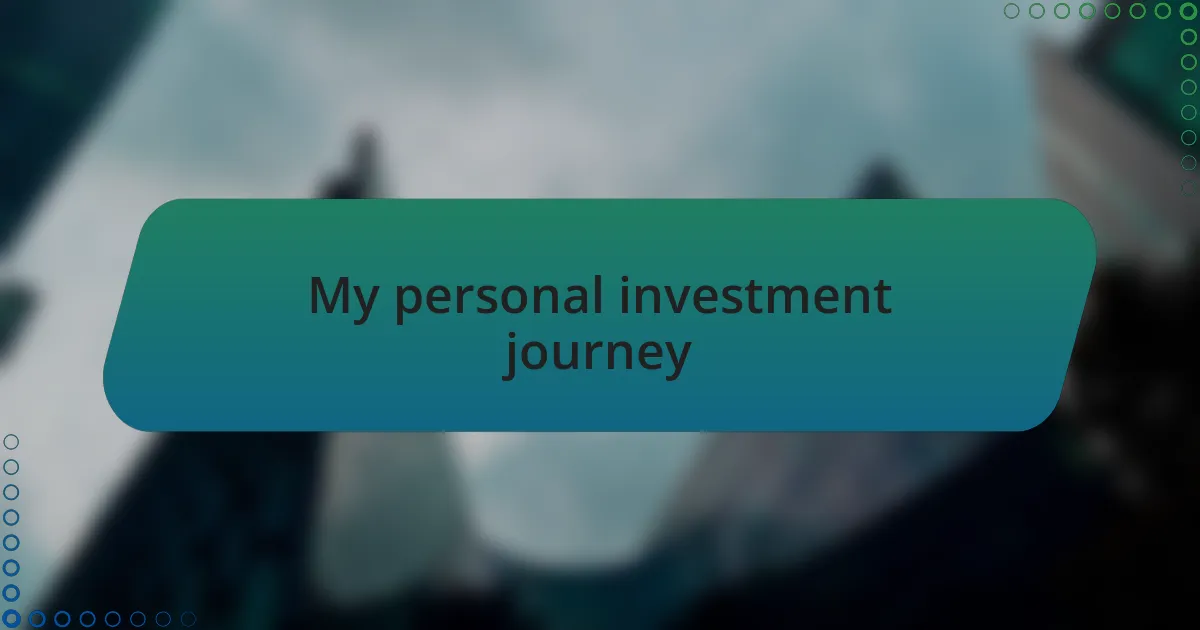Key takeaways:
- Investment consulting involves understanding individual investor goals and personalizing strategies to reduce complexity and build confidence.
- Small business investments drive economic growth, innovation, and community engagement, highlighting the impact of each dollar invested.
- Successful investment strategies include diversification, thorough research, and maintaining a long-term perspective to mitigate risks and embrace opportunities.
- Evaluating investment opportunities requires considering both quantitative metrics and qualitative factors, such as leadership and personal values.
Understanding investment consulting
Investment consulting is more than just numbers and graphs; it’s about understanding the unique vision and goals of each investor. I remember when I first sought advice from a consultant; they didn’t just throw a few stock recommendations my way. Instead, they took the time to understand my values and long-term aspirations, which made the entire experience feel so much more personal.
At times, I’ve felt overwhelmed by the complexities of investment choices. It’s crucial for a consultant to break down these complexities into manageable pieces. When my consultant explained various strategies—like diversification or asset allocation—through relatable examples, it changed my perspective entirely. Suddenly, I wasn’t just investing; I was building a strategy that made sense for my life.
Have you ever wondered how some investors seem to thrive while others struggle? Often, the difference lies in the guidance they receive from their investment consultants. I’ve seen firsthand how a tailored approach can turn hesitation into confidence, empowering individuals to take ownership of their financial futures. It’s this level of personalized insight that transforms uncertainty into informed decision-making, making all the difference in the long run.

Importance of small business investment
Small business investment plays a critical role in driving economic growth and creating jobs. I recall the sense of achievement I felt when I decided to invest in my local community by supporting a startup. Watching it flourish not only provided me with a return but also invigorated the entire neighborhood.
Additionally, investing in small businesses fosters innovation and diversity within the market. I once partnered with a small tech firm that brought a fresh perspective to a saturated industry. That experience taught me that the ideas emerging from such businesses often lead to advancements we never knew we needed.
Have you considered how small investments can lead to significant impact? Each dollar invested can ripple through the community, creating new opportunities and inspiring others to contribute. From my experience, the connections formed through these ventures often lead to deeper relationships and a robust network of support, turning solitary gains into collective successes.

Key strategies for successful investment
When it comes to successful investment, diversification stands out as a crucial strategy. I remember a time when I focused too narrowly on a single sector and faced unexpected downturns. Since then, I’ve made it a priority to spread my investments across various industries. This not only helps mitigate risks but also opens up new avenues for growth. Have you explored how diversifying your portfolio could protect you against market volatility?
Another key strategy is thorough research. Each time I’ve invested without fully understanding the business model, I’ve faced challenges later on. One particular investment taught me the importance of digging deep into financials, market potential, and even the team behind the startup. By asking questions and seeking clarity, I’ve made more informed decisions that ultimately paid off. What steps do you take to ensure you’re well-informed before making an investment?
Maintaining a long-term perspective is vital, too. I vividly recall a startup I invested in that faced numerous obstacles early on. Instead of panicking and pulling out my investment, I chose to stand by it. Over time, the business adapted and thrived. This experience solidified my belief that patience can be incredibly rewarding in the investment world. How do you keep your focus on long-term gains, especially during turbulent times?

Evaluating investment opportunities
When evaluating investment opportunities, I find it essential to consider both qualitative and quantitative factors. For instance, I once invested in an innovative tech startup primarily because of its impressive metrics, but I later realized the team lacked essential experience. That taught me that numbers alone can be misleading. Do you think the right leadership can make or break a business?
Another method I use is assessing the competitive landscape. I recall evaluating two similar businesses; one had a clear niche with loyal customers, while the other was lost in a saturated market. By choosing the former, I not only felt more secure in my investment but also saw better growth potential. Have you ever weighed the advantages of a unique selling proposition against broader market appeal?
Finally, I always recommend reflecting on your personal values and interests as part of the evaluation process. When I invested in a sustainability-focused company, it felt more rewarding than any return could measure. Aligning my investments with my principles not only ignites passion but also fosters a deeper connection to the success of the business. How do your values influence your investment choices?

My personal investment journey
My personal investment journey has been a blend of excitement and learning, often shaped by the choices I made along the way. I recall my first investment in a local café. Initially drawn to the vibrant atmosphere and the owner’s passion, I dismissed the troubling financial metrics. This experience taught me the hard way that a compelling vision can sometimes cloud judgment. Do you think understanding the numbers can enhance the emotional connection with a business?
As my journey progressed, I ventured into real estate. I still remember the thrill of securing my first rental property. The idea of creating a passive income was exhilarating, but it soon became clear that managing tenants was no easy feat. Each challenge taught me resilience and the importance of thorough planning. Have you ever faced unexpected hurdles while trying to realize a goal?
One aspect of my investment approach that has remained consistent is my focus on mentorship. I’ve invested in businesses led by individuals who genuinely sought guidance. It’s rewarding to share what I’ve learned and witness their growth. This gives me a sense of purpose beyond just financial returns. How do you see mentorship influencing the journey of entrepreneurship?

Lessons learned from my experiences
Often, I’ve found that the role of emotions in investment decisions can lead me down unexpected paths. For instance, during my venture into an e-commerce startup, I was captivated by the passion of the founders. However, my gut feeling didn’t align with the market trends I ignored. This taught me that emotional investment should enhance, not replace, strategic analysis. Have you ever let excitement overshadow rational assessment in your own decisions?
Another powerful lesson emerged when I encountered a downturn in my portfolio. I vividly recall that sinking feeling as market conditions shifted unexpectedly. Instead of panicking, I leaned into research and recalibrated my strategy. This experience reinforced my belief in the importance of adaptability and continuous learning in investment. It’s essential to keep your mind open—how do you typically handle setbacks in your investment journey?
Finally, networking with fellow investors has profoundly shaped my insights. I remember attending a small local investment group where one of my peers shared their missteps—a painful loss that turned into a valuable lesson. Listening to their story helped me refine my own strategies and avoid similar pitfalls. It’s a reminder of the power of shared experiences in guiding us toward success. How do you perceive the role of community in your own investment endeavors?







